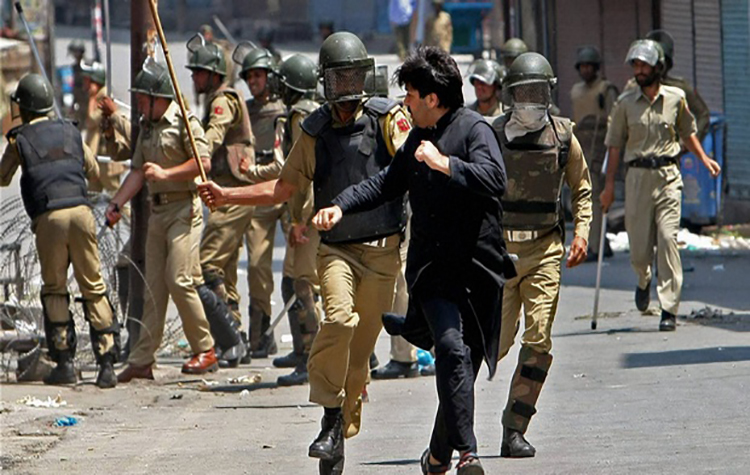(Bangkok/Kathmandu, 14 July 2016) – The Asian Forum for Human Rights and Development (FORUM-ASIA) is deeply concerned about the ongoing violence and humanitarian crisis in Jammu and Kashmir. Following the killing of a 22-year-old Hizbul Mujahideen leader on 8 July 2016, large-scale protests have led to deadly clashes between protesters and security forces.
According to the British Broadcasting Corporation (BBC), at least 36 people have been killed and about 1,500 injured. Local media has reported that most of the injured have suffered bullet and pellet wounds. Children, women and onlookers are also injured. The excessive use of force by security forces is reported to be such that even ambulances carrying the injured to hospitals have been attacked and patients prevented from medical treatment. Due to the impact of pellet guns, a large number of protesters with eye injuries are at risk of losing their eyesight permanently.
The curfew imposed in large parts of Srinagar city and several areas of South Kashmir has badly affected people’s daily life. Acute shortage of food items and lifesaving medicines is reported in curfew-affected areas. The continued suspension of mobile and internet service has imposed an information blackout making it difficult for people to communicate.
The clashes between the protesters and security forces should immediately come to a halt. It was reported that a few individuals were engaged in violence during the protests. Such behaviour cannot be condoned. However, some protesters behaving violently cannot justify security forces resorting to excessive force. Security forces are expected to take all measures necessary to ensure that the protest is managed as peacefully as possible. As the UN Special Rapporteur on the rights to freedom of peaceful assembly and of association, Maina Kiai, stresses in his report on his mission to Chile, “the violent elements should be extracted from the protest and dealt with in accordance with the rule of law. … Individuals retain at all times their rights to life and physical integrity, even if they become violent during protests, and it is the State’s duty to safeguard these rights.”
International law prohibits the excessive use of force. Law enforcement officials should “apply non-violent means before resorting to the use of force and firearms,” and “only if other means remain ineffective or without any promise of achieving the intended result.”[1] Even when force is used as the last resort, it should respect the principles of legality, necessity, and proportionality. In Jammu and Kashmir, such measures do not appear to be taken.
The Supreme Court of India, in its judgment of 8 July 2016 on the use of excessive force by armed forces under Armed Forces (Special Powers) Act, has categorically stated that members of armed forces cannot kill citizens “on the mere allegation or suspicion that they are enemy” and warned that doing so would put “not only the rule of law but our democracy… in grave danger.” The judgment further states that the law of the land applies equally to all irrespective of “whether the victim was a common person or a militant or a terrorist”, adding that equal application of the law “is the requirement of a democracy and the requirement of preservation of the rule of law and the preservation of individual liberties.”
FORUM-ASIA strongly urges the Government of India to abide by its international commitments and obligations including its own constitutional obligations, and uphold the values of a democratic state. It should immediately abstain from deploying disproportionate use of force against protesters and ensure free access to medical care to those injured. The Government of India is also urged to ensure essential supplies to the local population, restore communication and internet services that have been cut off, and restore normalcy before the situation slips towards a much graver and an unmanageable humanitarian crisis.
About FORUM-ASIA:
FORUM-ASIA is a Bangkok-based regional human rights group with 58 member organisations in 19 countries across Asia. FORUM-ASIA has offices in Bangkok, Jakarta, Geneva and Kathmandu. FORUM-ASIA addresses key areas of human rights violations in the region, including freedom of expression, assembly and association, human rights defenders, and democratisation.
For further inquiries, please contact:
South Asia Programme, FORUM-ASIA, [email protected]
Click here to download the statement. (PDF)
[1] http://www.ohchr.org/EN/ProfessionalInterest/Pages/UseOfForceAndFirearms.aspx



